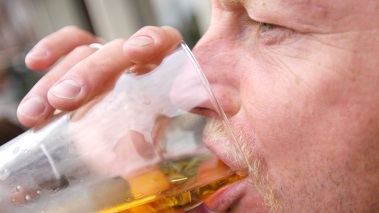
The proposed guidelines, published by the Department of Health and out for consultation, make 3 main recommendations on safe levels of alcohol consumption.
Alcohol is one of the biggest avoidable risks for disease and death. Between 2010 and 2011, alcohol misuse led to 1.2 million hospital admissions 15,000 deaths.
Alcohol misuse also carries an economic burden costing the NHS around £3.5 billion per year, with annual cost to society in England of around £21 billion.
The latest proposed guidelines follow a review of existing guidelines by three independent groups of experts, and have been considered and accepted by the UK Chief Medical Officers (CMO).
The guidelines set out the following recommendations:
- A weekly guideline on regular drinking
- Advice on single episodes of drinking
- A guideline on pregnancy and drinking
New weekly guidelines for people who drink regularly or frequently
The proposed guidelines say that any level of drinking raises the risk of a range of illnesses that include cancers of the mouth, throat and breast.
Men are now advised to drink no more than 14 units per week to keep their health risks at a low level. This is the same level advised for women.
The guidelines recommend that it is best to spread the amount of alcohol consumed over 3 days or more. Having one or two heavy drinking sessions increases the risks of death from long-term illnesses and accidents and injuries.
The guidelines also advise that a good way to reduce alcohol intake is to have several alcohol-free days a week.
Short-term risks can be avoided by limiting the amount of alcohol consumed on any one occasion, drinking more slowly, and drinking with food and alternating with water.
For pregnant women, or those planning a pregnancy, the guidelines say the safest approach is to drink no alcohol at all to keep risks to the fetus to a minimum.
The advice is that drinking in pregnancy can lead to long-term harm to the baby, with the more you drink, the greater the risk.
NICE advice on alcohol to prevent illness in later life
The guidelines follow and complement NICE advice on the prevention of illness in later life which was published October 2015.
NICE guidance states that alcohol consumption can increase the risk of dementia, disability and frailty. As such people should be encouraged to reduce the amount they drink as much as possible.
Recommendations include making alcohol less accessible, affordable and acceptable, continuing to work to prevent illicit alcohol sales, and ensuring plans include screening and brief interventions for people at risk of an alcohol-related problem.
Further recommendations cover changes to modifiable risk factors that can reduce a range of non-communicable disease such as type 2 diabetes, cardiovascular disease and certain cancers.
Help with making informed choices on alcohol consumption
Commenting on the new DH guidelines, Professor Gillian Leng, Deputy Chief Executive and Health and Social Care Director at NICE, said: “NICE welcomes these proposed new guidelines on alcohol, which set out 3 main recommendations on drinking. We know that alcohol-related harm is a major public health problem, and that generally, people in this country are currently drinking more than they should do.”
She added: “NICE has recently produced guidance on mid-life approaches to delaying or preventing the onset of dementia, disability and frailty in later life which outlines clear, evidence-based recommendations on ways to encourage people to reduce the amount they drink.
“Both this, and the proposed new Department of Health guidelines should help people make informed choices on their alcohol consumption.”
Baroness Delyth Morgan, Chief Executive at Breast Cancer Now, said: “This is a real step in the right direction on alcohol in the UK. We welcome the CMO’s recommendation as we’ve known for some time that regularly drinking alcohol increases your risk of developing breast cancer.
“There is unfortunately no ‘safe’ alcohol limit when it comes to increasing one’s cancer risk. It’s imperative that men and women fully understand the risks involved and that clear information about the alcohol content of all drinks is now provided.”
Sir Ian Gilmore, Chair of the Alcohol Health Alliance UK, who sat on the group advising the CMOs, added: “People have a right to know the risks associated with drinking alcohol. Only with accurate and transparent information are people able to make an informed choice about how much alcohol they consume.”